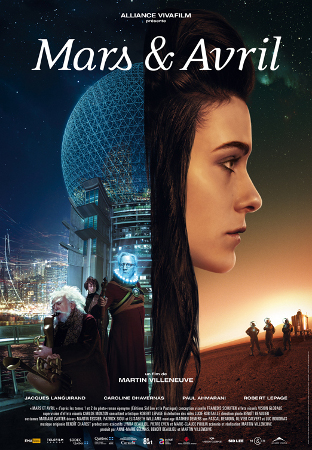 Science fiction from Quebec that isn’t perfect (far from it!) but deserves points for effort. The budget was outrageously low (a little over $2 million Canadian) yet the film has a scope and ambition worthy of writer-director Martin Villenevue’s older brother Dennis’s BLADE RUNNER: 2049.
Science fiction from Quebec that isn’t perfect (far from it!) but deserves points for effort. The budget was outrageously low (a little over $2 million Canadian) yet the film has a scope and ambition worthy of writer-director Martin Villenevue’s older brother Dennis’s BLADE RUNNER: 2049.
The basis of 2012’s MARS AND APRIL (MARS ET AVRIL) was a vastly acclaimed two-part French graphic novel from 2002/06 (of which no English translation currently exists). Martin Villeneuve, a longtime STAR WARS and BACK TO THE FUTURE fanatic, wrote the screen adaptation himself, and made his feature directorial debut with the film—after which he, like his brother, was heavily courted by Hollywood.
The multi-pronged story admittedly takes some time grab hold. It’s set in a futuristic era where a trip to Mars is hatched. There’s dissention in the form of a widely disseminated claim that the surface of Mars is arranged musically, and that the planet may not in fact exist (thus setting in motion a Philip K. Dickian clash between reality and non-reality that grows increasingly prevalent). This is according to the deeply eccentric professor Eugene (Robert LePage), who’s transformed himself an entirely virtual being due to a fear of aging.
An all-male convoy of astronauts blasts off to explore Mars, believing their destiny is to repopulate the planet (despite the absence of women). The voyage, broadcast to viewers via holographic television, goes off without incident.
In the meantime we’re introduced to Arthur (Paul Ahmarani), Eugene’s son, who designs instruments for Jacob Obus (Jacques Languirand), an elderly musician. April (Caroline Dhavernas), a young photographer who’s obsessed with Jacob’s music, approaches him one night after a concert, thus initiating a highly unlikely May-December romance—and setting in motion a conflict with Arthur, who has his eye on April.
One night, upon stepping into a teleporter on the way to a concert with Jacob, April literally disappears—only to inexplicably reappear on the surface of Mars with the astronauts. This precipitates a descent into madness on the part of Jacob, whose succeeding exploits may or may not be entirely hallucinatory. Those exploits include a claim by Eugene that Jacob can travel to Mars and meet April via a specially designed machine that renders the unconscious literal. Jacob agrees to hook his mind up to the device, with results that are unexpected, to say the least…
MARS AND APRIL is marked by impressively stylized visuals, and no wonder, as the visually gifted theatrical impresario/filmmaker Robert Lepage (of LE CONFESSIONAL and POSSIBLE WORLDS, and the role of Eugene in this film) is credited as an “artistic consultant.” Yet Martin Villeneuve himself also deserves credit, evincing a wholly unique and distinct filmmaking sensibility that offers up quite a few wondrous images, such as a Martian mountain range shaped like a woman’s naked body and the sight of the digitized Eugene, as a seemingly flesh and blood human with a flickering digital head.
As for the film’s budget-lite futuristic landscapes, they often resemble those of Enki Bilal’s IMMORTAL (2004)—and that’s not a compliment, as it means a lot of substandard CGI was involved. Another problem is with the many weirdness-for-weirdness’s sake elements and forced eccentricity, such as photographs taken with an old timey box camera amid an otherwise high tech milieu and many of the overtly hallucinatory elements of the final third, which tries (and mostly fails) to capture a hint of the final scenes of 2001: A SPACE ODYSSEY.
But one has to admire Villeneuve’s no-budget ingenuity, which included the creation of otherworldly musical instruments he paid for by selling them to Cirque De Soleil (for whom Villeneuve directed a couple documentary shorts). Not too many filmmakers could create such a fully realized sci fi universe with the absurdly limited resources with which Villeneuve had to make do, but he achieved just that, and with undeniable skill.
Vital Statistics
MARS AND APRIL (MARS ET AVRIL)
Alliance Vivafilm
Director: Martin Villeneuve
Producers: Benoit Beaulieu, Anne-Marie Gelinas, Martin Villeneuve
Screenplay: Martin Villeneuve
Cinematography: Benoit Beaulieu
Editing: Mathieu Demers
Cast: Jacques Languirand, Caroline Dhavernas, Paul Ahmarani, Robert LePage, Jean Asselin, Stephane Demers, Jean Marchand, Kathleen Fortin, Marcel Sabourin, Andre Montmorency, Gabriel Gascon, Emanuel Hoss-Desmarais, Pierre Leblanc, Richard Robitaille, Khanh Hua
